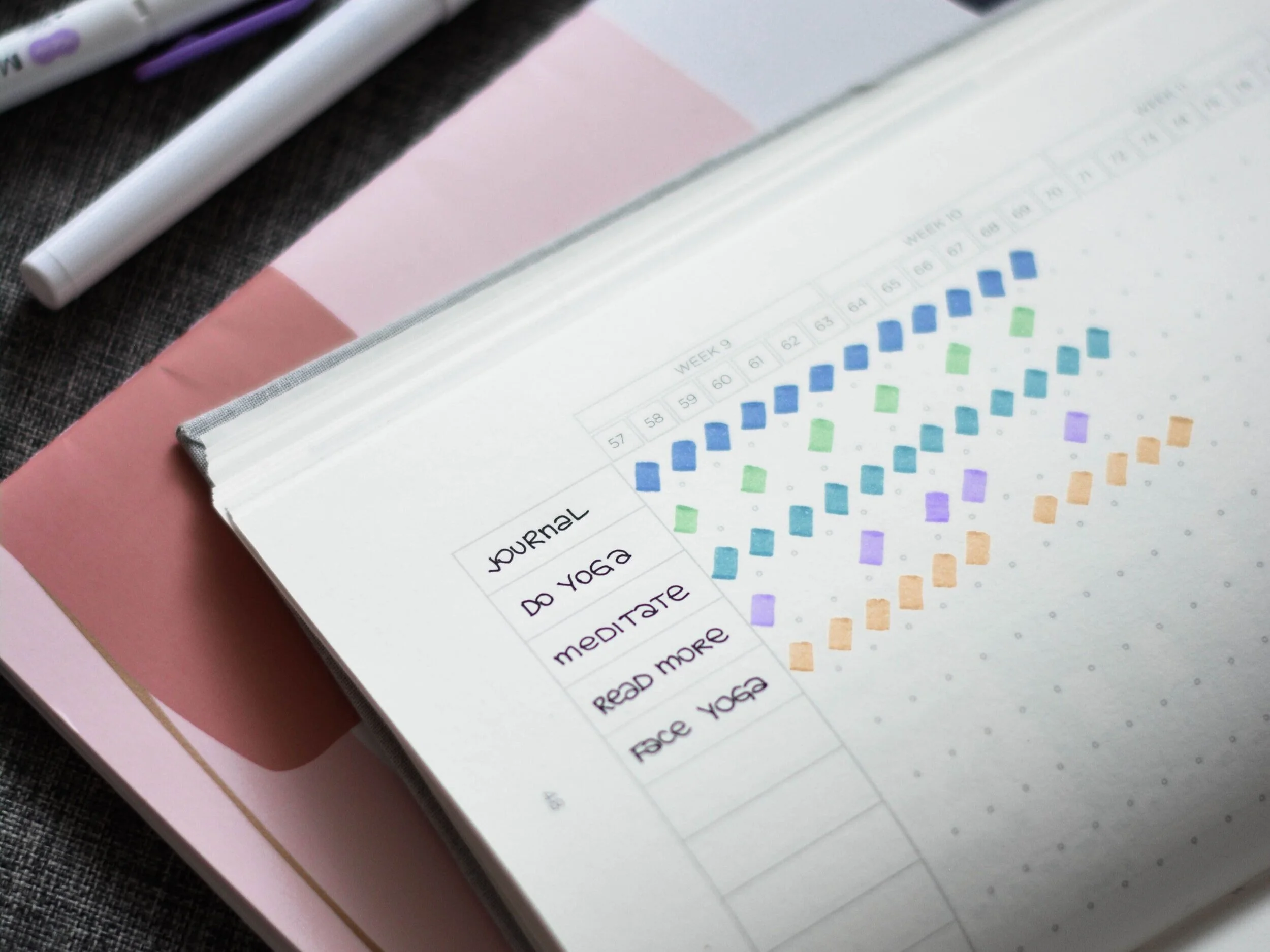Habit change - How small changes can (successfully) form lifelong habits
At some point, we’ve all considered how to change, break or form a habit. Whether that’s fuelled by a desire to work out or become more organised, the vast majority of us are under the belief that we could accomplish the desired outcome if we had more willpower or motivation. Yet lack of willpower or motivation as the reason why our habits haven’t changed is a slightly inaccurate story we’ve been told so lets dispel the myth that you’re somehow a ‘bad’ person or insufficient in some way. Habit change not only means understanding what needs a particular habit meets, it’s also about being realistic in how we go about forming them.
In his thought-provoking, habit changing book “Atomic Habits” (2018), James Clear explains one of the reasons our habit changes don’t stick is because we have the insufficient systems in place for our success. When we focus on the goal/outcome, we forget about all the small steps in between that we need to shift in order to achieve the greater change. We set out with the best intentions and full of motivation, only to find life gets in the way and our motivation wains. Because let’s face it, motivation can be a fickle beast - it’s unreliable and unpredictable. Which is why we need to focus on something other than waiting for motivation to show up at our door to let us know it’s ready to go. That’s where the idea of systems comes into play.
When we have systems in place that support us in reaching our desired destination, it decreases our reliance on hoping that solely motivation will carry us there.
WHAT IS A SYSTEM?
'Systems are processes that lead to results' (Clear, 2018. Pg.23)
By having an overarching goal - for example a desire to ‘be healthy’ which is a fairly common goal and also incredibly ambiguous in it’s definition, we then need to look at how we will support ourselves in reaching the position of being healthy. The systems in achieving this may include meal planning, batch cooking, working out… and each of those systems are kind of goals too. What happens when we begin to look at systems is we realise that in order to change habits and achieve goals we have to think ‘Tiny’. Shrink and map out our systems so we know what to put in place. A small habit of laying out my workout clothes every evening, acts as a prompt to workout when I wake up which in turn means I’ve achieved the goal of working out and therefore on the road to my overarching goal of being more healthy. Yet… habit change isn’t one dimensional and nor is it as easy as simply having a prompt. We also need to be able to complete the goal, in alignment with the Goldilocks Rule. An element of habit change B.J. Fogg refers to as ‘ability’.
BEHAVIOUR CHANGE = MOTIVATION + ABILITY + PROMPT.
Fogg (2019) is a Stanford researcher and author of ‘Tiny Habits’, a brilliant and enlightening book that maps out how we can understand our habits, how to change or incorporate new ways. Interesting fact, Fogg's students used his teachings in order to develop an app that went on to be worth 100 billion dollars. Through understanding how people interacted, the students, Kevin Systrom and Mike Krueger went on to create Instagram. But in order to change habits or influence them, we have to start small. Humans tend to choose the path of least resistance or friction, if we can make life easier for ourselves we will. Simply look at the amount of convenience food and services available (Such as Amazon Prime). Having a system in place helps reduce the friction that might come between us and creating a habit. In his book, B.J. Fogg discusses his tiny habit of only flossing one tooth as a way into ensuring he flossed and looked after his teeth! I really don’t want to spoil the book as I’ve garnered so much personal insight from it, but working out where our friction is and what habits we’re more likely to gravitate towards (instead of the idealised version where we jump in with motivation and impatience!)
Yet this can also work in reverse. For example, if we want to be more productive in the morning yet know we spend 20 minutes on the endless scroll of Instagram, we might consider putting our phone in airplane mode or in a different room to where we sleep. By increasing friction for habits we wish to remove, we are less likely to retreat to our old habits.
So how exactly does flossing a tooth, only doing 2 squats or laying out my clothes the night before help me create successful lifelong habits? Well, it’s all about the ‘neurones that fire together, wire together’ principle. When we create small habit changes we’re forging new pathways in our beautiful brains. Once these pathways are created, then we can start adding the brickwork or cement. The small habit changes are the foundations NOT the end results. Too often we focus on the end goal which can be a long way off, but accomplishing a small habit, rewarding ourselves for that (not overboard but just smiling or acknowledging it aloud is sufficient for our brains) cultivates a sense of motivation through action.
Working through the exercises in order to improve my sleep…
And if we consider doing the thing that needs doing before doing the thing we want - e.g. doing 2 squats whilst the kettle boils and then rewarding myself with my morning coffee, adds in the concepts that Charles Duhigg (2013) explores in his book, The Power of Habit. The “Cue - Habit - Reward” system allows the habit to prompt a boost of the good hormones so that everytime we conduct the habit, we feel good. Over time, these habits are stored in our basal ganglion, a part of our brain that is responsible for storing habits so we can pretty much do them on automatic. Small habit changes allow us to re-programme ourselves. Now that is a sentence I never anticipated writing as a humanistic therapist, as we tend not to look at behaviour so much as underlying emotional processes. But as with everything, even I’m permitted a shift in my own identity when matters are bought to my awareness and I genuinely believe it to be of help to others, as I’ve been road-testing these principles in my own life to my improvement. I’ve deep dived into my habits around sleeping and can happily report back that I now sleep better than I have in years. I’ve become my future friend by ensuring I prioritise my sleep as that influences my mornings, my emotional regulating and my personal attitude to life. Yes, sleep really has been that important for me!
Whilst we can consider how to cultivate small habit change and create systems to support them in order to ensure we’re navigating towards our destination (goal), I’d highly recommend reading and/or listening to the three books I’ve mentioned here. Their principles can be applied to nearly all habits I can think of..? What I have noticed, and my partner has kindly affirmed this shift by offering me feed back, is my mindset. I’ve become more willing and resilient to tackle my own habits because I’ve broken them down into manageable yet evident changes which has fed into my sense of personal accomplishment. And yes, I’ll be covering mindset in my next post.
Until then, what habits have you wanted to change or attempted to which have resulted in your feeling ‘like a failure’? How might you break them down into smaller chunks? And what simple reward might you offer yourself that actively encourages your brain to make positive associations? I’d love to hear from you in the comments.


